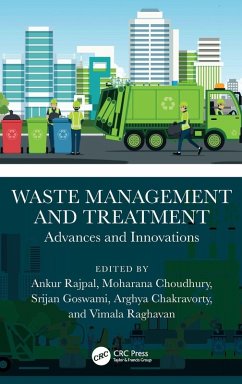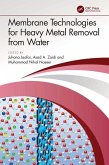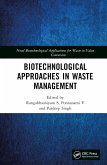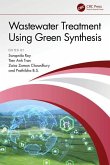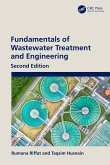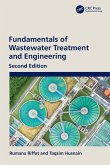Waste Management and Treatment
Advances and Innovations
Herausgegeben:Rajpal, Ankur; Choudhury, Moharana; Goswami, Srijan; Chakravorty, Arghya; Raghavan, Vimala
Waste Management and Treatment
Advances and Innovations
Herausgegeben:Rajpal, Ankur; Choudhury, Moharana; Goswami, Srijan; Chakravorty, Arghya; Raghavan, Vimala
- Gebundenes Buch
- Merkliste
- Auf die Merkliste
- Bewerten Bewerten
- Teilen
- Produkt teilen
- Produkterinnerung
- Produkterinnerung
This book covers environmental and economic waste treatment with resource recovery strategies covering mining, urban, agricultural, industrial, and sewage wastes. It includes waste management, life-cycle assessment, recycling, and recovering valuable materials from blast furnace slags, iron ore, coal, and bauxite mining. Wastewater recycling, reuse, treatment methods, and economic gain through nanotechnology are covered, along with biochemical study cycles in mining waste and tailing, landfill stabilization, energy, and nutrient recovery from household, urban, and hazardous waste.
Features:…mehr
Andere Kunden interessierten sich auch für
![Membrane Technologies for Heavy Metal Removal from Water Membrane Technologies for Heavy Metal Removal from Water]() Membrane Technologies for Heavy Metal Removal from Water137,99 €
Membrane Technologies for Heavy Metal Removal from Water137,99 €![Biotechnological Approaches in Waste Management Biotechnological Approaches in Waste Management]() Biotechnological Approaches in Waste Management165,99 €
Biotechnological Approaches in Waste Management165,99 €![Integrated Waste Management Integrated Waste Management]() Integrated Waste Management126,99 €
Integrated Waste Management126,99 €![Wastewater Treatment Using Green Synthesis Wastewater Treatment Using Green Synthesis]() Wastewater Treatment Using Green Synthesis137,99 €
Wastewater Treatment Using Green Synthesis137,99 €![Nature-Based Wastewater Treatment Systems Nature-Based Wastewater Treatment Systems]() Nature-Based Wastewater Treatment Systems159,99 €
Nature-Based Wastewater Treatment Systems159,99 €![Fundamentals of Wastewater Treatment and Engineering Fundamentals of Wastewater Treatment and Engineering]() Rumana Riffat (USA George Washington University)Fundamentals of Wastewater Treatment and Engineering123,99 €
Rumana Riffat (USA George Washington University)Fundamentals of Wastewater Treatment and Engineering123,99 €![Fundamentals of Wastewater Treatment and Engineering Fundamentals of Wastewater Treatment and Engineering]() Rumana Riffat (USA George Washington University)Fundamentals of Wastewater Treatment and Engineering66,99 €
Rumana Riffat (USA George Washington University)Fundamentals of Wastewater Treatment and Engineering66,99 €-
-
-
This book covers environmental and economic waste treatment with resource recovery strategies covering mining, urban, agricultural, industrial, and sewage wastes. It includes waste management, life-cycle assessment, recycling, and recovering valuable materials from blast furnace slags, iron ore, coal, and bauxite mining. Wastewater recycling, reuse, treatment methods, and economic gain through nanotechnology are covered, along with biochemical study cycles in mining waste and tailing, landfill stabilization, energy, and nutrient recovery from household, urban, and hazardous waste.
Features:
Includes details on the generation and composition of hazardous wastesFocuses on practices in waste management followed in developing countriesIllustrates the concept of energy and resource recoveryExplains ethical, innovative management strategies dealing with solid, biomedical, and chemical wastesDiscusses sustainable nanotechnology and engineered materials for treatment of biological and chemical pollutants in wastewater
This book is aimed at researchers and graduate students in environmental engineering and management.
Features:
Includes details on the generation and composition of hazardous wastesFocuses on practices in waste management followed in developing countriesIllustrates the concept of energy and resource recoveryExplains ethical, innovative management strategies dealing with solid, biomedical, and chemical wastesDiscusses sustainable nanotechnology and engineered materials for treatment of biological and chemical pollutants in wastewater
This book is aimed at researchers and graduate students in environmental engineering and management.
Produktdetails
- Produktdetails
- Verlag: CRC Press / Taylor & Francis
- Seitenzahl: 348
- Erscheinungstermin: 31. Juli 2024
- Englisch
- Abmessung: 240mm x 161mm x 23mm
- Gewicht: 630g
- ISBN-13: 9781032192567
- ISBN-10: 1032192569
- Artikelnr.: 69113574
- Herstellerkennzeichnung
- Libri GmbH
- Europaallee 1
- 36244 Bad Hersfeld
- gpsr@libri.de
- Verlag: CRC Press / Taylor & Francis
- Seitenzahl: 348
- Erscheinungstermin: 31. Juli 2024
- Englisch
- Abmessung: 240mm x 161mm x 23mm
- Gewicht: 630g
- ISBN-13: 9781032192567
- ISBN-10: 1032192569
- Artikelnr.: 69113574
- Herstellerkennzeichnung
- Libri GmbH
- Europaallee 1
- 36244 Bad Hersfeld
- gpsr@libri.de
Dr. Ankur Rajpal has a Ph.D. in environmental science, and currently, he is working as Project Scientist-C and is responsible for international and national wastewater, sludge, and solid waste management-related projects at the Indian Institute of Technology Roorkee (IITR), India. Earlier, he worked at Hong Kong Baptist University (HKBU), Hong Kong, as a postdoc fellow. He also worked as Senior Research Fellow on the Central Pollution Control Board (CPCB), MoEF, Delhi, India.Dr. Rajpal is a fellow and life member of several professional bodies and organizations such as IWA, ANSF, etc. During past years, he has published more than 30 peer-reviewed articles in international journals. He is an active reviewer of several international journals and has participated in more than 25 international and national conferences. His research achievement has included many academic honours, such as Young Scientist Award (2019) from national level agencies. International travel grants from DST and CSIR, India, and several best paper awards. His research interests focus on problems related to wastewater and bio-waste treatment, enhancement of nutrient recovery, and micro-pollutant removal from the waste and wastewater. Moharana Choudhury is a researcher and environmentalist from Guwahati, Assam, India. He has completed his education as M.Sc., PGDGIS, PGDEM, and PGCGARD from Gurukul Kangri Deemed to be University, Haridwar, Uttarakhand, North Eastern Hill University, Shillong Meghalaya, Tezpur University, Assam, and NIRD Hyderabad, respectively. Choudhury has worked on several scientific projects in various government departments and has more than 11 years of research and working experience in the field of the environment. He began his career as a research intern at the National Institute of Disaster Management in New Delhi, followed by the North Eastern Space Application Center/ISRO Unit (Department of Space, Government of India) as Junior Research Fellow. Choudhury has authored or edited five books with internationally reputed publishing houses, contributed more than 31 articles in national and internationally reputed journals and proceedings, and more than 26 book chapters. He has also written many articles and scientific reports in popular magazines. Choudhury is working on various environmental conservation activities in Assam and the country. He has worked on several initiatives to integrate environmentally sustainable projects for iconic heritage places, wetlands, and ecotourism spots in Assam, India, especially for cleanliness and beating single-use plastic pollution missions. He contributes to various environmental research, management, social media mass awareness, and research studies. He is also well known in India for his efforts to implement environmental education and safeguard the privileges of environmental degree holders in India. Srijan Goswami, Author and Editor of several Medical Science Books (PG-Research category), is pursuing a Ph.D. in biotechnology from the Department of Biotechnology, University of North Bengal, India, under supervision of Dr. Manab Deb Adhikari. He is a Physician of Biochemic System of Medicine and also holds a specialization in medical biotechnology and clinical nutrition. He received his professional training on community nutrition and child care, medical microbiology, medical biochemistry, and diabetes counselling from reputed medical colleges in Kolkata, India. He is experienced in teaching at diverse range of Paramedical and Lifesciences Departments of reputed colleges and institutions. He is presently associated as Research Coordinator, Biomedical Research and Allied Sciences Division, Voice of Environment, Assam, India.Dr. Goswami, has around 11 years of experience in the field of teaching and research and has published four books (and six in pipeline), and approximately 40 research papers in national and international journals. He has independently and successfully guided around 10 undergraduate and postgraduate students to complete their research work and publications in the past three years. Dr. Goswami has received four Letters of Commendation for Global Community Services and the Certificate of Honor for his contribution in the field of science and knowledge from the International Journal of Agricultural Research, Sustainability and Food Sufficiency (IJARSFS), International Journal of Advances in Medical Sciences and Biotechnology(IJAMSB), and International Journal of Health, Safety and Environment (IJHSE) in 2019, 2020, 2021, and 2023. The Current Research in Nutrition and Food Science(Enviro Research Group) and Academia Scholarly Journals have awarded him the Certificate of Excellence as a Reviewer in 2020, 2021, and 2023. He is actively asso-ciated as Editorial Review Board of 15 international journals. Arghya Chakravorty is an early career researcher, doctoral fellow at the Centre for Nanotechnology Research, Vellore Institute of Technology - Vellore, India; and European Union's Horizon 2020-funded visiting researcher at the Institute of Physical Chemistry, Warsaw, Poland. He holds six Indian patents, while his research interest lies in interdisciplinary material science and nanobiotechnology. Recently he has edited two books, Handbook of Porous Carbon Materials for Springer Nature; and Waste Management and Treatment:Advances and Innovations for Taylor & Francis. As an early researcher, he has also published a dozen research and review papers and book chapters with international repute. Before starting his research journey, he earned his B.Sc. Honors (Microbiology) from Midnapore College, India, and a first-class M.Sc. (Microbiology) from Hemvati Nandan Bahuguna Garhwal University, A Central University, India. He is an active member of the American Chemical Society, Royal Society of Chemistry, Solid Waste Association of North America, and British Society for Antimicrobial Chemotherapy. Dr. Vimala Raghavan is an enthusiastic and innovative Associate Professor at the Centre for Nanotechnology Research, Vellore Institute of Technology, Vellore, India, and has an h-index (Google Scholar) of 22. She received her Ph.D. degree in environmental biotechnology from VIT, Vellore, India. She has guest-edited several special issues of SCI- and SCOPUS-indexed journals, while her research interest is in various niche areas of nanotechnology, like hybrid nanobiomaterials, synthesis, and applications in therapeutics, diagnostics, environmental remediation, and energy sector. She has guided six Ph.D. scholars and more than 30 master's project students. She is currently guiding three Ph.D. scholars as well as serving as an investigator of several internationally and nationally funded research projects. She has more than 80 international and national journal publications and has contributed in many book chapters and many conference papers.
1. Introduction to Environmental Waste: A Serious Issue. 2. Effect of Improper Waste Disposal on Environmental, Physical, and Emotional Wellbeing of Human Being. 3. An Integrated Approach towards Sustainable Waste Management: Decentralized and Community Based Practices. 4. Solid Waste Management. 5. Solid Wastes: Basic Knowledge on Sources and Types for Better Management. 6. Municipal Solid Waste Management of Different Socio-Economic Group towards Sustainable Development Goals. 7. Managing Solid Wastes In Developing Countries: Insights from Three Indian Smart Cities. 8. Impact and Revival of Sustainable Solid Waste Management for Green Environment. 9. Recent Trends in Sanitary Landfilling and Future Prospect. 10. Potential For Applicability Of Decentralized Approaches In Sewage Treatment Systems Globally. 11. A Comprehensive Characterization of Wastewater and Sewage Sludge In SBR-Based STPS of India. 12. Advances In Nanoribbons Structured Nanomaterials for the Wastewater Treatment. 13. Beneficial Bacteria in Restoring the Soil Contamination Caused Due To Intense Agrochemicals. 14. Innovations in Nanotechnology for Wastewater Treatment. 15. Waste Management: Learning and Challenges from a Case Study of a University Model in India. 16. Biochar Production from Crop Residues. 17. Sustainable Waste Management and Women's Empowerment. 18. Application of Remote Sensing Techniques in Solid Waste Management.
1. Introduction to Environmental Waste: A Serious Issue. 2. Effect of Improper Waste Disposal on Environmental, Physical, and Emotional Wellbeing of Human Being. 3. An Integrated Approach towards Sustainable Waste Management: Decentralized and Community Based Practices. 4. Solid Waste Management. 5. Solid Wastes: Basic Knowledge on Sources and Types for Better Management. 6. Municipal Solid Waste Management of Different Socio-Economic Group towards Sustainable Development Goals. 7. Managing Solid Wastes In Developing Countries: Insights from Three Indian Smart Cities. 8. Impact and Revival of Sustainable Solid Waste Management for Green Environment. 9. Recent Trends in Sanitary Landfilling and Future Prospect. 10. Potential For Applicability Of Decentralized Approaches In Sewage Treatment Systems Globally. 11. A Comprehensive Characterization of Wastewater and Sewage Sludge In SBR-Based STPS of India. 12. Advances In Nanoribbons Structured Nanomaterials for the Wastewater Treatment. 13. Beneficial Bacteria in Restoring the Soil Contamination Caused Due To Intense Agrochemicals. 14. Innovations in Nanotechnology for Wastewater Treatment. 15. Waste Management: Learning and Challenges from a Case Study of a University Model in India. 16. Biochar Production from Crop Residues. 17. Sustainable Waste Management and Women's Empowerment. 18. Application of Remote Sensing Techniques in Solid Waste Management.

